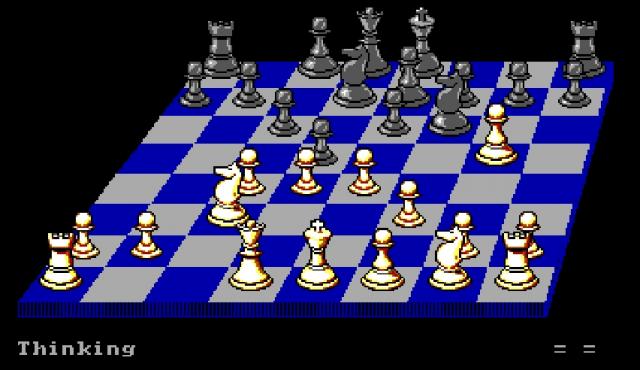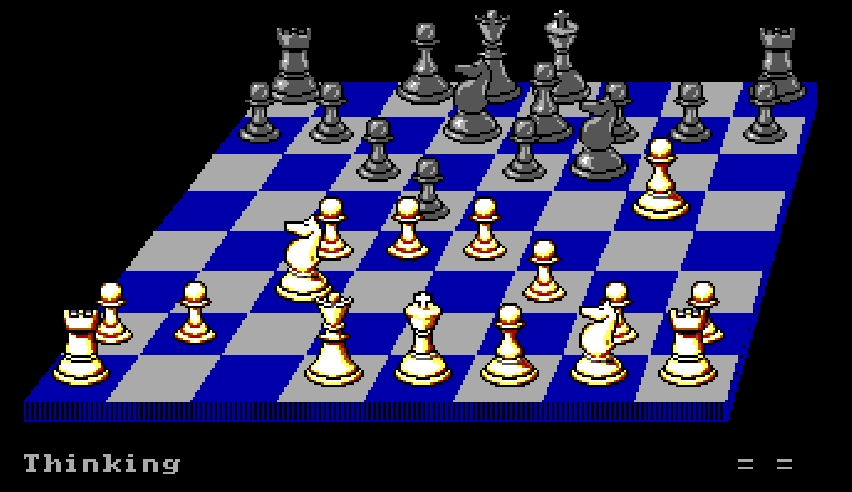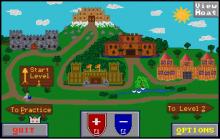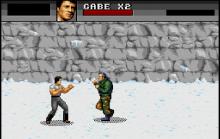Chess Simulator
How to play Chess Simulator
- Start the game: Load Chess Simulator on your DOS-compatible PC.
- Choose game mode: Select either single-player against the computer or two-player mode.
- Move pieces: Click on a piece to select it, then click on the destination square to move.
- Follow chess rules: Play according to standard chess rules, aiming to checkmate your opponent's king.
- End game: The game ends when one player checkmates the other, resigns, or agrees to a draw.
Chess Simulator Description
Chess Simulator is a classic strategy game released in 1990 for the DOS operating system. Designed to bring the timeless game of chess to the digital realm, this game offers an engaging and challenging experience for both novice and seasoned players. With a straightforward top-down perspective, Chess Simulator replicates the traditional chessboard, allowing players to immerse themselves in strategic battles against a computer opponent or a friend.
The game captures the essence of chess, focusing on skillful planning and tactical maneuvers. Whether you're perfecting your opening moves or planning a checkmate, Chess Simulator provides a platform to sharpen your chess skills. The digital interface makes it easy to navigate, and the game's simplicity ensures that the focus remains on the strategic depth that chess is known for.
Chess Simulator stands out with its clean graphics and intuitive controls, making it accessible for players of all ages. The DOS platform brings a nostalgic charm, reminding players of the early days of computer gaming. This game is a perfect way to enjoy chess without the need for a physical board, making it a convenient option for quick games or long strategic sessions.
Cheats/Hints/Walkthroughs for Chess Simulator

Chess Simulator - additional information

Chess Simulator (1990 DOS Game): A Deep Dive into a Classic Strategy Game
Chess Simulator, released in 1990, is a timeless DOS game that brings the intellectual rigor and strategic depth of chess to the computer screen. Developed during an era when digital gaming was burgeoning, Chess Simulator stands out for its meticulous replication of the traditional chess experience and its user-friendly interface. In this article, we’ll explore the intricacies of Chess Simulator, its gameplay, historical context, and its enduring legacy in the world of digital chess.
The Historical Context of Chess Simulator
Chess Simulator was launched at a time when personal computers were becoming more common in households, and gaming was starting to gain significant traction. The late 1980s and early 1990s were marked by rapid advancements in computer graphics and processing power, which allowed for more sophisticated and engaging games. Chess Simulator took advantage of these technological advancements to offer a digital chess experience that was both accessible and challenging.
Gameplay and Features of Chess Simulator
Realistic Chess Experience
Chess Simulator is designed to provide a realistic and immersive chess-playing experience. The game features a traditional 8x8 chessboard with pieces accurately represented, ensuring that players familiar with physical chess boards would find the transition to digital play seamless.
Multiple Difficulty Levels
One of the standout features of Chess Simulator is its range of difficulty levels. Whether you are a novice looking to learn the basics or an experienced player seeking a formidable challenge, Chess Simulator caters to all skill levels. The game’s AI is designed to simulate various levels of human opponents, offering a dynamic and engaging experience.
User Interface and Controls
The game’s interface is straightforward and intuitive, making it easy for players to navigate through different options and settings. The controls are simple, allowing players to focus on their strategies rather than being bogged down by complex commands. Moves can be made using the keyboard or mouse, providing flexibility in how players interact with the game.
The Impact of Chess Simulator on Digital Chess
Chess Simulator played a pivotal role in popularizing digital chess. By making chess accessible on personal computers, it helped introduce the game to a broader audience who might not have otherwise engaged with it. The game’s educational value also cannot be overstated; it provided a platform for new players to learn and practice chess, honing their skills against a computerized opponent.
Similar Games to Chess Simulator
For enthusiasts looking to explore similar games, the following titles offer comparable experiences:
- Battle Chess (1988): Known for its animated chess pieces that come to life and battle each other, Battle Chess adds a layer of entertainment to the traditional game.
- Chessmaster 2000 (1986): Another classic, Chessmaster 2000, is renowned for its strong AI and comprehensive tutorials, making it a great choice for players of all levels.
- Fritz Chess (1991): Offering advanced AI and detailed analysis tools, Fritz Chess is ideal for players looking to improve their game through in-depth study.
Legacy and Modern Relevance of Chess Simulator
Even though technology has significantly advanced since 1990, Chess Simulator remains a beloved classic among retro gaming enthusiasts. Its simplicity, coupled with the strategic depth of chess, ensures that it continues to be enjoyed by players today. Modern iterations of digital chess owe much to pioneers like Chess Simulator, which laid the groundwork for the sophisticated chess engines and online platforms we see today.
Chess Simulator is more than just a game; it’s a digital homage to one of the oldest and most respected strategy games in history. Its contribution to the digitalization of chess and its role in making the game accessible to a wider audience cannot be overstated. Whether you’re revisiting this classic or discovering it for the first time, Chess Simulator offers a compelling and enriching experience that stands the test of time.
Explore the world of Chess Simulator and other classic games at Classic Reload, where the past and present of gaming converge. Dive into the nostalgia and discover why these timeless titles continue to captivate players across generations.
















Write a comment